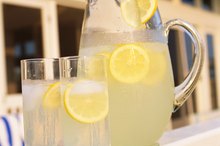High Calorie & Low Nutrient Density Foods
Foods that are low in nutrients and high in calories generally provide your body with little energy and lots of empty calories. These types of foods should make up the very smallest part of your diet – if any part at all. High-calorie, low-nutrient foods typically contain large amounts of sugars and include junk foods, soft drinks and candy. Eating too many of these foods can lead to weight gain and even chronic medical conditions like obesity, heart disease and diabetes.
Foods
Candies, sugary cereals and sweets contain large amounts of calories with few nutrients. Even processed snack foods that are low in fat can be high in calories and low in nutrition. Potato chips, doughnuts, french fries, cookies, cakes and brownies also fall into this category. Cupcakes, croissants, pudding and ice cream, as well as white and brown sugar are high in calories but low in nutrients, too. Condiments like jellies and jams, syrups, whipped cream, many salad dressings, butter, mayonnaise, shortening, sauces and gravies are high-calorie, low-nutrient items, as well.
- Candies, sugary cereals and sweets contain large amounts of calories with few nutrients.
- Cupcakes, croissants, pudding and ice cream, as well as white and brown sugar are high in calories but low in nutrients, too.
Beverages
Review of Lifewater by SoBe
Learn More
Certain beverages are common culprits in many people’s diets for empty calories. Sugary drinks like sodas and drink mixes are loaded with calories but contain virtually no nutrients whatsoever. Alcoholic drinks like liquor, wine and beer also belong to this category. Whole milk could also belong to this group, but the beverage is rich in certain nutrients like calcium, despite its high amounts of fats and calories. Keep in mind that although the diet versions of beverages like sodas contain artificial sweeteners to replace the sugar and reduce the calories, these drinks still typically contain little to no nutrients.
- Certain beverages are common culprits in many people’s diets for empty calories.
- Whole milk could also belong to this group, but the beverage is rich in certain nutrients like calcium, despite its high amounts of fats and calories.
Considerations
Keep in mind that cutting your calorie intake while maintaining a nutritious diet is easy if you first cut out these types of foods. Cut your calorie intake by choosing lower-calorie food and drink options, as well as by reducing your portion sizes. In addition to the basic food groups, the United States Department of Agriculture also sets out a certain amount of discretionary calories in a daily diet. Discretionary calories are a small percentage of your daily caloric allowance that are allowed for alcohol, sugars, solid fats and other high-calorie, low-nutrient food. The allowances are very small and usually only 100 to 300 calories per day, but they can help to keep you on track without ruining your diet by overindulging in cravings for sweets, junk foods or sodas.
- Keep in mind that cutting your calorie intake while maintaining a nutritious diet is easy if you first cut out these types of foods.
- The allowances are very small and usually only 100 to 300 calories per day, but they can help to keep you on track without ruining your diet by overindulging in cravings for sweets, junk foods or sodas.
Significance
The Calories in Skyy Vodka
Learn More
The proteins and carbohydrates in the foods you eat contain calories, but these types of calories are necessary to fuel your body. Although proteins and carbs contain only about 4 calories per 1 gram, fats contain 9 calories per 1 gram, and alcohol has about 7 calories – but without essential nutrients. Although foods and beverages like bananas, avocados, milk, granola, eggs, meats and olive oil are all considered high-calorie items, they’re also rich in various nutrients. So even if you’re counting calories to control your weight, you shouldn’t eliminate from your diet certain foods that may contain moderate amounts of calories but large amounts of nutrients.
- The proteins and carbohydrates in the foods you eat contain calories, but these types of calories are necessary to fuel your body.
Related Articles
References
- University of Pittsburgh Medical Center: Getting to the Heart of a Healthy Diet – Empty-Calorie Foods
- University of Maryland Medical Center: Weight Control and Diet
- U.S. Department of Health and Human Services and U.S. Department of Agriculture. 2015–2020 Dietary Guidelines for Americans. 8th Edition. December 2015.
- Hall KD, Chow CC. Why is the 3500 kcal per pound weight loss rule wrong?. Int J Obes (Lond). 2013;37(12):1614. doi:10.1038%2Fijo.2013.112
Resources
Writer Bio
Sarah Terry brings over 10 years of experience writing novels, business-to-business newsletters and a plethora of how-to articles. Terry has written articles and publications for a wide range of markets and subject matters, including Medicine & Health, Eli Financial, Dartnell Publications and Eli Journals.









